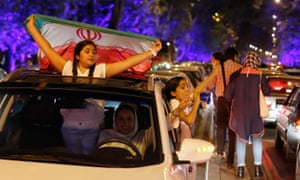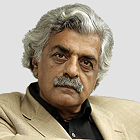'People will forgive you for being wrong, but they will never forgive you for being right - especially if events prove you right while proving them wrong.' Thomas Sowell
Search This Blog
Showing posts with label Venezuela. Show all posts
Showing posts with label Venezuela. Show all posts
Sunday, 12 July 2020
Monday, 25 February 2019
Friday, 11 August 2017
The west is gripped by Venezuela’s problems. Why does it ignore Brazil’s?
Reporters ask Jeremy Corbyn if he will condemn Nicolás Maduro. But the undemocratic abuses of Michel Temer aren’t flashy enough for the news cycle
Julia Blunck in The Guardian
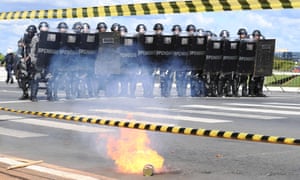
Julia Blunck in The Guardian

‘Brazil has carried on as most stories about Latin America do: unnoticed and uncommented on.’ Riot police monitor protests against the government of Michel Temer in Brasilia, May 2017. Photograph: Evaristo Sa/AFP/Getty Images
Venezuela is the question on everyone’s lips. Rather, Venezuela is the question on reporters’ lips whenever they see Jeremy Corbyn: will he condemn the president, Nicolás Maduro? What is his position on Venezuela, and how does it affect his plans for Britain? The actual problems of Venezuela – a complex country with a long history that does not start with the previous president Hugo Chávez and certainly not with Jeremy Corbyn – are largely ignored or pushed aside. This is nothing new: most of the time, Latin America’s debates are seen through western lenses.
Venezuela is the question on everyone’s lips. Rather, Venezuela is the question on reporters’ lips whenever they see Jeremy Corbyn: will he condemn the president, Nicolás Maduro? What is his position on Venezuela, and how does it affect his plans for Britain? The actual problems of Venezuela – a complex country with a long history that does not start with the previous president Hugo Chávez and certainly not with Jeremy Corbyn – are largely ignored or pushed aside. This is nothing new: most of the time, Latin America’s debates are seen through western lenses.
Of course, the situation in Venezuela is deplorable and worrying. But it’s easy to see that concern about Maduro’s undemocratic abuses don’t necessarily come from actual concern for the welfare of Venezuelan people.
Nearby neighbour Brazil has not been analysed or debated at length, even as it demonstrates similar problems. The country’s president, Michel Temer, recently escaped measures that would see him put to trial in the supreme court by getting congress to vote them down. The case against Temer was not a flimsy or partisan one: there was a mountain of evidence, including recordings of him openly debating kickbacks with corrupt businessman Joesley Batista. That a president put into power under circumstances that could be, at best, described as dodgy, manages to remain in power by buying favours from Congress, even as he passes the harshest austerity measures in the world should be enough to raise a few eyebrows internationally. But that has not happened, and Brazil has carried on as most stories about Latin America do: unnoticed and uncommented on.
Part of this discrepancy is of course the bias toward what is flashy. Stories about sordid Congress deals are not that interesting to foreign audiences, and even many exhausted and demoralised Brazilians felt this was simply another addition to a long list of humiliations that began in 2015 when the economy started to sink.
Meanwhile, Venezuela has human conflict, the thing that produces exciting photography and think-pieces, sparks debate and crucially, draws clicks. There’s only so much attention to be gained talking about Temer’s undermining of democracy as it happens without noise, through chicanery and articulation by Brazil’s traditional power: the “Bible, beef and bullets” caucuses in Congress. Venezuela’s situation, however, is urgent, with tanks on the streets and opposition arrests.
Yet there is a subtext to why Brazil’s democracy is not as interesting, and why even Temer’s introduction of the military on to Rio de Janeiro’s streets to address a crime wave has prompted little response. Temer’s rule is one of hard capitalism and an ever-shrinking state. He has established a ceiling on public spending, slashed workers rights, and imposed a hard reform of retirement age.
Temer’s rise to power came as it became clear to big business that his predecessor, Dilma Rousseff, would not go far with austerity. They financed and stimulated protests – largely by rightly angry middle-class Brazilians at what they saw as widespread corruption – while Congress blocked Rousseff’s bills or sabotaged her agenda in other ways.
Latin American suffering is being played out as a proxy for debates in the UK
While Temer did not seize power through a violent coup, and the alliance between Rousseff’s Workers’ party and his notoriously dishonest and chronically double-crossing party was a largely self-inflicted wound, it bears remembering that Rousseff was ousted on a technicality so that Temer could solve the economy’s woes by making “difficult decisions”, a platform for which he had no electoral mandate.
And yet the economy continues to sink, as the unemployment rate soars to 13%. That narrative isn’t very convenient, though, and nobody is interested in making Brazil the representative case of how capitalism is an undemocratic system doomed to fail. And that is quite right: capitalism cannot be exclusively defined by Brazilian failures. The same should be true of socialism in Venezuela.
Somehow, though, the conversation about Venezuela is actually a conversation about something else. Latin American suffering is being played out as a proxy for debates in the UK. As the rightwing media claim, Jeremy Corbyn might not care very much about the thousands going hungry by Maduro’s hand – maybe he too thinks it is simply a consequence of American meddling – but it’s hard to believe that the British right is sincerely committed to the region’s stability and democracy. There has been very little said about Temer.
The failures of Temer do not, and should not be used to, excuse Maduro’s. Nor should we equate the two men in brutality. Yet, if you live in Brazil where public servants are teargassed for not being paid for five months, where indigenous rights activists and others are killed by rich farmers in unprecedented numbers, where several states declare bankruptcy because of a crash in oil prices, where the army is called upon to tackle protesters, you may wonder when your situation will be worth debating.
The answer is whenever it becomes politically convenient. In the end, British commentators and politicians on both the left and right aren’t just opportunistic when it comes to Latin American suffering, they are glad when it happens: it proves their point, whatever that may be. Our lives are just a detail.
Nearby neighbour Brazil has not been analysed or debated at length, even as it demonstrates similar problems. The country’s president, Michel Temer, recently escaped measures that would see him put to trial in the supreme court by getting congress to vote them down. The case against Temer was not a flimsy or partisan one: there was a mountain of evidence, including recordings of him openly debating kickbacks with corrupt businessman Joesley Batista. That a president put into power under circumstances that could be, at best, described as dodgy, manages to remain in power by buying favours from Congress, even as he passes the harshest austerity measures in the world should be enough to raise a few eyebrows internationally. But that has not happened, and Brazil has carried on as most stories about Latin America do: unnoticed and uncommented on.
Part of this discrepancy is of course the bias toward what is flashy. Stories about sordid Congress deals are not that interesting to foreign audiences, and even many exhausted and demoralised Brazilians felt this was simply another addition to a long list of humiliations that began in 2015 when the economy started to sink.
Meanwhile, Venezuela has human conflict, the thing that produces exciting photography and think-pieces, sparks debate and crucially, draws clicks. There’s only so much attention to be gained talking about Temer’s undermining of democracy as it happens without noise, through chicanery and articulation by Brazil’s traditional power: the “Bible, beef and bullets” caucuses in Congress. Venezuela’s situation, however, is urgent, with tanks on the streets and opposition arrests.
Yet there is a subtext to why Brazil’s democracy is not as interesting, and why even Temer’s introduction of the military on to Rio de Janeiro’s streets to address a crime wave has prompted little response. Temer’s rule is one of hard capitalism and an ever-shrinking state. He has established a ceiling on public spending, slashed workers rights, and imposed a hard reform of retirement age.
Temer’s rise to power came as it became clear to big business that his predecessor, Dilma Rousseff, would not go far with austerity. They financed and stimulated protests – largely by rightly angry middle-class Brazilians at what they saw as widespread corruption – while Congress blocked Rousseff’s bills or sabotaged her agenda in other ways.
Latin American suffering is being played out as a proxy for debates in the UK
While Temer did not seize power through a violent coup, and the alliance between Rousseff’s Workers’ party and his notoriously dishonest and chronically double-crossing party was a largely self-inflicted wound, it bears remembering that Rousseff was ousted on a technicality so that Temer could solve the economy’s woes by making “difficult decisions”, a platform for which he had no electoral mandate.
And yet the economy continues to sink, as the unemployment rate soars to 13%. That narrative isn’t very convenient, though, and nobody is interested in making Brazil the representative case of how capitalism is an undemocratic system doomed to fail. And that is quite right: capitalism cannot be exclusively defined by Brazilian failures. The same should be true of socialism in Venezuela.
Somehow, though, the conversation about Venezuela is actually a conversation about something else. Latin American suffering is being played out as a proxy for debates in the UK. As the rightwing media claim, Jeremy Corbyn might not care very much about the thousands going hungry by Maduro’s hand – maybe he too thinks it is simply a consequence of American meddling – but it’s hard to believe that the British right is sincerely committed to the region’s stability and democracy. There has been very little said about Temer.
The failures of Temer do not, and should not be used to, excuse Maduro’s. Nor should we equate the two men in brutality. Yet, if you live in Brazil where public servants are teargassed for not being paid for five months, where indigenous rights activists and others are killed by rich farmers in unprecedented numbers, where several states declare bankruptcy because of a crash in oil prices, where the army is called upon to tackle protesters, you may wonder when your situation will be worth debating.
The answer is whenever it becomes politically convenient. In the end, British commentators and politicians on both the left and right aren’t just opportunistic when it comes to Latin American suffering, they are glad when it happens: it proves their point, whatever that may be. Our lives are just a detail.
Wednesday, 30 December 2015
Recession, retrenchment, revolution? Impact of low crude prices on oil powers
Guardian writers: Shaun Walker in Moscow Dominic Rushe in New YorkChris Stein in Lagos Chris Stephen in Tunis Sibylla Brodzinsky in Caracas Hugh Miles in Cairo and Saeed Kamali Dehghan
A glut of oil, the demise of Opec and weakening global demand combined to make 2015 the year of crashing oil prices. The cost of crude fell to levels not seen for 11 years – and the decline may have further to go.
There have been four sharp increases in the price of oil in the past four decades – in 1973, 1979, 1990 and 2008 – and each has led to a global recession. By that measure, a lower oil price should be positive for the world economy, with lower fuel costs for consumers and businesses in those countries that import crude outweighing the losses to producing nations.
But the evidence since oil prices started falling from their peak of $115 a barrel in August 2014 has not supported that thesis – or not yet. Oil producers have certainly felt the impact of the lower prices on their growth rates, their trade figures and their public finances but there has been no surge in consumer spending or business investment elsewhere.
Economist still reckon there will be a boost from a lower oil price particularly if it looks as if the lower cost of crude will be sustained.
Dhaval Joshi, an economist at BCA, a London-based research company, said: “A commodity bubble has deflated three times in the past 100 years: the first was after world war one; the second was after the 1980s oil shock; the third is happening right now.”
For the big producer countries, this is a major headache, the ramifications of which are only starting to be felt. Oil powers base their spending plans on an assumed crude price. The graphic below shows just how far below water their budgets are.
Joshi says crude prices may fall by a further 35% to reach its long-term trend. That would mean an oil price closer to $25 a barrel - and fiscal crises in some of the world’s most pivotal economies.
Saudi Arabia
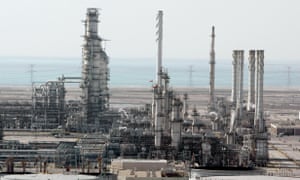
The Ras Tanura oil production plant in Saudi Arabia’s eastern province. Photograph: Bilal Qabalan/AFP/Getty Images
Low oil prices are not just squeezing Saudi Arabia’s domestic budget, imposing austerity on a kingdom not used to it: it is taking its toll on Saudi support for foreign projects too.
The kingdom this week announced swingeing budget cuts for 2016 to address an alarming deficit of 15% of GDP run up this year. Subsidies for water, electricity and petroleum products are likely to be cut, and government projects reined in.
But overseas beneficiaries will face some austerity too. For years, Saudi Arabia has used its oil wealth to support friends and allies around the world, including media organisations, thinktanks, academic institutions, religious schools and charities. Countries that have traditionally benefited from Saudi largesse include Jordan, Lebanon, Bahrain, Palestine and Egypt.
But now the IMF has raised the prospect that Saudi Arabia could go bankrupt in five years without changes to its economic policy, cuts in support to foreign allies seem inevitable.
Egypt’s black-hole economy is potentially the kingdom’s most expensive foreign policy commitment. In recent years, Saudi Arabia has donated billions in cash and oil products but, despite this, the Egyptian economy, battered by war, terrorism and political instability, is facing an acute foreign currency shortage.
Speculation is mounting that Saudi financial support to Egypt is starting to dry up – something the Egyptian authorities have denied – and that this is damaging the bilateral relationship.
There have been some signs of tension. In July, Egypt’s oil minister said he had no objections to importing crude oil from Iran, a move sure to ruffle the Saudis. In September, the Saudi journalist Jamal Khashoggi – known for his closeness to the Saudi state – raised eyebrows when he said the new Egyptian culture minister, Hilmi al-Namnam, who is well known for his secularism and dislike of Wahhabi Islam, should never have been appointed.
So far, the Saudi authorities have given few clear signs about how they are planning to respond to the oil price crisis, let alone lay out a long-term plan for a post-oil Saudi Arabia.
Options under consideration are thought to include cutting construction projects, energy subsidies and public sector wages, introducing new taxes and privatisations, and issuing debt.
Another possibility foreign observers have posited is that the Saudis will be forced to unpeg the riyal from the dollar, although given the potential this would have for uncontrollable knock-on effects on the rest of the economy, this seems likely to be a last resort.
Cuts impacting on ordinary Saudis are something the government will be keen to avoid to maintain political stability, so industry, the public sector and foreign allies are likely to bear the brunt of the economic burden.
Nigeria
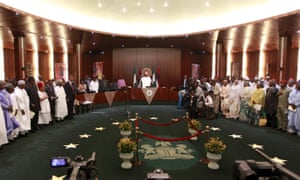
Nigeria’s president, Muhammadu Buhari, swears in his cabinet in November. Photograph: Afolabi Sotunde/Reuters
The oil price slump has not prevented Nigeria’s new government from unveiling big spending plans – but analysts warn that the generosity is misplaced at a time when oil prices languish below $40 a barrel.
Nigeria is Africa’s top oil producer and the World Bank estimates crude sales fund about 75% of the country’s budget.
In its £19.8bn budget proposal, the government plans to increase spending by about one quarter over last year’s budget, and to pay for it by improving tax collection and cutting the cost of government.
The budget includes £1.65bn for cash transfers to poor Nigerians. The programme was a campaign promise of the president, Muhammadu Buhari, who was elected in March on a platform of cutting corruption and weaning Nigeria’s economy off its dependence on oil revenue.
But some analysts think the proposed budget is unrealistic during times of $40 oil.
“This brings a dose of reality to a people who have extremely high expectations,” said Bismarck Rewane, the chief executive of Financial Derivatives Co. He predicted the government would have to back down on some of its promises.
Nigeria is Africa’s largest economy, but most of the money is concentrated in the hands of a wealthy elite and about two-thirds of Nigerians live in poverty, according to the United Nations development programme.
Analysis Nigeria overtakes South Africa to become Africa's largest economy. Complicated statistical recalculation adds $240bn to the economy - the equivalent of finding six Ghanas within Nigeria, says Tolu Ogunlesi
Unemployment has climbed this year, hitting 9.9% in the third quarter, according to the National Bureau of Statistics.
Chuba Ezekwesili, research analyst at Nigerian Economic Summit Group, says despite the falling price of crude, the country has been able to avoid a jump in inflation by imposing limits on the availability of foreign currency.
While other major oil producing economies have let their currencies lose value along with oil prices, Nigeria has spent its reserves to prop up the value of the naira. But Ezekwesili says they can only do that for so long.
“They’re sort of delaying the inevitable,” he said. “I feel like eventually it has to give way, and by the time it does I feel the economy is going to be hurt because a lot of businesses can’t work under those conditions.”
Ezekwesili was also sceptical of the government’s ability to generate the revenue necessary to pay for programmes such as cash transfers to the poor. He doubts the government can accomplish its goals of streamlining its costs and generating more revenue by next year.
“One thing I’ve learned about policies in Nigeria is we tend to be very optimistic but it never really works out exactly as we want it to,” Ezekwesili said.
Russia
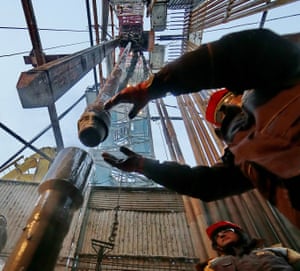
Oil extraction at a Gazprom field in Khanty-Mansiysk, Russia. Photograph: TASS/Barcroft Media
Vladimir Putin goes into 2016 with record approval ratings but the shakiest economic outlook since he took charge. In the 15 years he has been at the helm, 2015 was the first year that real wages registered a decline, something that did not happen even during the 2008-09 financial crisis.
Oil and gas exports make up about half of the Russian budget, and the rouble rate has been strongly linked to the price of oil.
Sanctions against Russia, particularly the ban on Russian banks seeking western credit, combined with falling oil prices in late 2014 to create a perfect storm that demolished the rouble, with the currency losing half of its value against the dollar, reviving memories of previous crashes. The currency regained some of its value by spring, but falling oil prices in autumn have caused it to fall back to lows similar to those it experienced in late 2014.
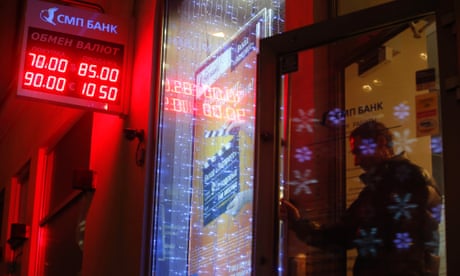
Rouble in freefall despite rate hike
Falling oil prices were one of the principal reasons for the collapse in the Soviet economy, and some economists are warning of history repeating itself. Riding on a wave of high oil prices for most of his presidency, the Russian president did not expect such a sharp downturn. Last October, Putin said that if the price of oil fell below $80 a barrel, the world economy would crash. A range of other top Russian officials made similar statements, in effect ruling out the possibility that oil could fall below $70.
Some analysts say the rouble is still overvalued, and the current oil price should theoretically push the rouble down further. This is necessary to balance the budget: the fewer dollars Russia receives for the oil it sells, the higher the exchange rate needs to be for the budget to receive the requisite amount of roubles. For the budget to balance at 65 roubles, not far off the current rate, the price of oil should be $70, a recent Bank of America Merrill Lynch report found.
For ordinary Russians, it could be a tough year ahead. Those who were used to travelling abroad have already had to scale back as the rouble made the cost of visiting foreign cities prohibitive; and rising food prices have made it harder to balance the books for many families.
The 2016 budget, fixed in October, requires oil to be at $50 in order to run a 3% deficit within “acceptable” rouble rate limits, meaning if the price does not rise soon, cuts will need to be made or reserves spent. The war in Syria is an extra cost, and the announced increases in military spending are not likely to be reversed.
US
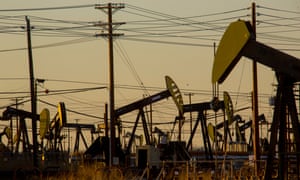
Belridge, California, is one of the oldest and largest oilfields in the US containing tens of thousands of wells, many of which are being fracked. Photograph: Les Stone/Corbis
Filling up at the gas station hasn’t been this cheap in the US since the recession. The nationwide average price of a gallon of regular is now $2.02 (£1.36), down 58 cents from this time last year, according to auto club AAA, and expected to fall further.
Scared that North America’s oil boom threatens its grip, Opec, the oil cartel, stepped up production and forced a price war that has driven oil prices down to below $35 a barrel. US consumers have benefited from lower petrol prices to the tune of about $700 a year, according to the US government, and that money is fuelling consumer spending. According to a recent report from JP Morgan, 80% of that saving is being spent on goods and services.
But the collapsing price of oil has also cast a shadow over the US energy industry – formerly one of the country’s fastest growing employers. Fracking – the controversial process of extracting oil and gas from shale rock – has become less attractive to investors as the oil price has fallen, and tens of thousands of jobs have been lost as a result. This year, the International Energy Agency said low oil prices would “slam the brakes” on the US shale industry and the impact is already being felt across the country’s oil producing areas.
The US energy sector has cut more than 90,000 jobs this year, according to outplacement company Challenger, Gray & Christmas. And while the overall US unemployment rate has continued to fall, in Texas unemployment has risen since August, according to the Bureau of Labour Statistics. In North Dakota, home of the Bakken shale oil field, more than 17% of the mining jobs – which include oil and natural gas – have disappeared in the past year. More jobs look certain to be lost in the coming months.
North of the border in Canada, things are even worse. In Alberta, “the Texas of the north”, job layoffs and the downturn of the economy have been blamed for a 30% rise in suicides between January and June, compared with 2014. In Saskatchewan, another energy-dependent region, there have been 19% more suicides this year.
Daniel Pavilonis, senior commodity broker with RJO Futures, said the situation was only likely to get worse for those employed in the US energy sector. “There are oil tankers just sitting off the coast because we don’t need more supply. We have too much,” he said. “There’s oversupply and a lack of anybody trying to tighten production because they don’t want to lose market share.”
As a result he predicts oil prices will go lower, taking more jobs with it. But for most consumers, it’s a win. Unlike other global economic trends, the oil price fall actually benefits average Americans, said Pavilonis. “This is our money,” he said. “For most people, it’s a good thing.”
Venezuela
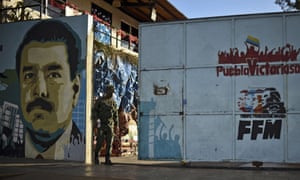
A mural depicts President Nicolás Maduro, who, having lost the Venezuelan National Assembly, has a battle to keep economy and his leadership afloat. Photograph: Luis Robayo/AFP/Getty Images
In most of the world, falling oil prices have caused significant reductions in petrol prices. But in the country with the world’s largest oil reserves, the oil glut could force a price rise.
“It’s probably the only place in the world where with oil prices so low, they may raise gasoline prices,” says Pedro Méndez, an informal taxi driver in Caracas, the Venezuelan capital, who fills the tank of his Ford Laser for less than a dollar.
But the lower the price of oil goes, the deeper Venezuela’s economy sinks. It’s near total dependence on crude exports for hard currency has seen the government of president Nicolás Maduro struggling to try keep the economy afloat.
The political effect is already being felt. Gripped by spiraling inflation, chronic shortages of basic goods and a quickly depreciating currency, Venezuelan voters this month gave the opposition an overwhelming majority in the new legislature, which takes office in January.
Each $1 drop in oil prices results in more than $685m in lost yearly oil income for PDVSA, the state-owned oil company, according to analysts.
And every drop in crude prices means less funding for the health, education and housing and other social welfare programmes that won Maduro’s predecessor, Hugo Chávez, widespread support for his self-styled “Bolivarian revolution”.
While dwindling oil revenue hurts the social programmes, Antonio Azpurua, a financial consultant with CFS Partners/LA Group, says it could be a blessing in disguise, allowing Venezuela to wean itself of its dependence on crude. “Venezuela needs to take advantage of low oil prices to build its industrial base,” he says.
With a super-majority in the National Assembly, the opposition could reverse some of Maduro’s populist measures, which have contributed to the current economic crisis. They could also choose to raise petrol prices.
Iran
Libya
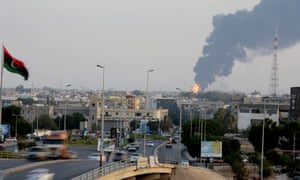
Fuel depots and tankers have been targets for years in the struggle for control of Libya and its oil resources. Photograph: EPA
Plunging oil prices are threatening disaster in Libya, where civil war has left the population depending on fast-dwindling oil revenues to survive.
Libya has Africa’s largest oil reserves and in normal times this provides 95% of the country’s export revenues, keeping the economy afloat. But civil war between rival governments at either end of the country has shattered the economy, leaving the population almost wholly dependent on revenue generated overseas.
The crash in oil prices has halved revenues, and shortages of foodstuffs and medicines – even petrol – are starting to be felt.
This cash squeeze has triggered a three-way battle for control of what remains of the country’s oil wealth. Much of Libya’s largest group of oil fields, the Sirte Basin, is now held by Islamic State, which has interposed itself between forces of the rival governments. Most of what remains is in eastern Libya, held by the elected parliament based in Tobruk.
Tobruk is using its status as the internationally recognised government to battle in foreign courts for the right to income from other producing fields, opposing the state-owned National Oil Corporation, whose headquarters remains in Tripoli, held by a rival parliament.
Tobruk has set up a second National Oil Corporation, based in eastern Libya, and last month demanded international oil companies switch payments that currently go to Tripoli.
Countering that, Tripoli’s NOC chief, Mustafa Sanallah, convened a conference in London in October calling on oil buyers to stick with him. Two of the world’s largest oil buyers, Glencore and Vitol, have agreed, but the eastern government has vowed legal action.
London courts are likely to be the proving ground for this test of wills, with both governments already gearing up for a precedent-setting high court battle, due early next year, for control of the Libya Investment Authority, the country’s £65bn sovereign wealth fund.
But whoever wins control of what remains of the oil industry may find it a pyrrhic victory. John Hamilton, director of London’s Cross-border Information, says the glut of oil on world markets and turbulence around the few remaining oil ports means Libyan oil has already been “priced out” by many buyers.
A glut of oil, the demise of Opec and weakening global demand combined to make 2015 the year of crashing oil prices. The cost of crude fell to levels not seen for 11 years – and the decline may have further to go.
There have been four sharp increases in the price of oil in the past four decades – in 1973, 1979, 1990 and 2008 – and each has led to a global recession. By that measure, a lower oil price should be positive for the world economy, with lower fuel costs for consumers and businesses in those countries that import crude outweighing the losses to producing nations.
But the evidence since oil prices started falling from their peak of $115 a barrel in August 2014 has not supported that thesis – or not yet. Oil producers have certainly felt the impact of the lower prices on their growth rates, their trade figures and their public finances but there has been no surge in consumer spending or business investment elsewhere.
Economist still reckon there will be a boost from a lower oil price particularly if it looks as if the lower cost of crude will be sustained.
Dhaval Joshi, an economist at BCA, a London-based research company, said: “A commodity bubble has deflated three times in the past 100 years: the first was after world war one; the second was after the 1980s oil shock; the third is happening right now.”
For the big producer countries, this is a major headache, the ramifications of which are only starting to be felt. Oil powers base their spending plans on an assumed crude price. The graphic below shows just how far below water their budgets are.
Joshi says crude prices may fall by a further 35% to reach its long-term trend. That would mean an oil price closer to $25 a barrel - and fiscal crises in some of the world’s most pivotal economies.
Saudi Arabia

The Ras Tanura oil production plant in Saudi Arabia’s eastern province. Photograph: Bilal Qabalan/AFP/Getty Images
Low oil prices are not just squeezing Saudi Arabia’s domestic budget, imposing austerity on a kingdom not used to it: it is taking its toll on Saudi support for foreign projects too.
The kingdom this week announced swingeing budget cuts for 2016 to address an alarming deficit of 15% of GDP run up this year. Subsidies for water, electricity and petroleum products are likely to be cut, and government projects reined in.
But overseas beneficiaries will face some austerity too. For years, Saudi Arabia has used its oil wealth to support friends and allies around the world, including media organisations, thinktanks, academic institutions, religious schools and charities. Countries that have traditionally benefited from Saudi largesse include Jordan, Lebanon, Bahrain, Palestine and Egypt.
But now the IMF has raised the prospect that Saudi Arabia could go bankrupt in five years without changes to its economic policy, cuts in support to foreign allies seem inevitable.
Egypt’s black-hole economy is potentially the kingdom’s most expensive foreign policy commitment. In recent years, Saudi Arabia has donated billions in cash and oil products but, despite this, the Egyptian economy, battered by war, terrorism and political instability, is facing an acute foreign currency shortage.
Speculation is mounting that Saudi financial support to Egypt is starting to dry up – something the Egyptian authorities have denied – and that this is damaging the bilateral relationship.
There have been some signs of tension. In July, Egypt’s oil minister said he had no objections to importing crude oil from Iran, a move sure to ruffle the Saudis. In September, the Saudi journalist Jamal Khashoggi – known for his closeness to the Saudi state – raised eyebrows when he said the new Egyptian culture minister, Hilmi al-Namnam, who is well known for his secularism and dislike of Wahhabi Islam, should never have been appointed.
So far, the Saudi authorities have given few clear signs about how they are planning to respond to the oil price crisis, let alone lay out a long-term plan for a post-oil Saudi Arabia.
Options under consideration are thought to include cutting construction projects, energy subsidies and public sector wages, introducing new taxes and privatisations, and issuing debt.
Another possibility foreign observers have posited is that the Saudis will be forced to unpeg the riyal from the dollar, although given the potential this would have for uncontrollable knock-on effects on the rest of the economy, this seems likely to be a last resort.
Cuts impacting on ordinary Saudis are something the government will be keen to avoid to maintain political stability, so industry, the public sector and foreign allies are likely to bear the brunt of the economic burden.
Nigeria

Nigeria’s president, Muhammadu Buhari, swears in his cabinet in November. Photograph: Afolabi Sotunde/Reuters
The oil price slump has not prevented Nigeria’s new government from unveiling big spending plans – but analysts warn that the generosity is misplaced at a time when oil prices languish below $40 a barrel.
Nigeria is Africa’s top oil producer and the World Bank estimates crude sales fund about 75% of the country’s budget.
In its £19.8bn budget proposal, the government plans to increase spending by about one quarter over last year’s budget, and to pay for it by improving tax collection and cutting the cost of government.
The budget includes £1.65bn for cash transfers to poor Nigerians. The programme was a campaign promise of the president, Muhammadu Buhari, who was elected in March on a platform of cutting corruption and weaning Nigeria’s economy off its dependence on oil revenue.
But some analysts think the proposed budget is unrealistic during times of $40 oil.
“This brings a dose of reality to a people who have extremely high expectations,” said Bismarck Rewane, the chief executive of Financial Derivatives Co. He predicted the government would have to back down on some of its promises.
Nigeria is Africa’s largest economy, but most of the money is concentrated in the hands of a wealthy elite and about two-thirds of Nigerians live in poverty, according to the United Nations development programme.
Analysis Nigeria overtakes South Africa to become Africa's largest economy. Complicated statistical recalculation adds $240bn to the economy - the equivalent of finding six Ghanas within Nigeria, says Tolu Ogunlesi
Unemployment has climbed this year, hitting 9.9% in the third quarter, according to the National Bureau of Statistics.
Chuba Ezekwesili, research analyst at Nigerian Economic Summit Group, says despite the falling price of crude, the country has been able to avoid a jump in inflation by imposing limits on the availability of foreign currency.
While other major oil producing economies have let their currencies lose value along with oil prices, Nigeria has spent its reserves to prop up the value of the naira. But Ezekwesili says they can only do that for so long.
“They’re sort of delaying the inevitable,” he said. “I feel like eventually it has to give way, and by the time it does I feel the economy is going to be hurt because a lot of businesses can’t work under those conditions.”
Ezekwesili was also sceptical of the government’s ability to generate the revenue necessary to pay for programmes such as cash transfers to the poor. He doubts the government can accomplish its goals of streamlining its costs and generating more revenue by next year.
“One thing I’ve learned about policies in Nigeria is we tend to be very optimistic but it never really works out exactly as we want it to,” Ezekwesili said.
Russia

Oil extraction at a Gazprom field in Khanty-Mansiysk, Russia. Photograph: TASS/Barcroft Media
Vladimir Putin goes into 2016 with record approval ratings but the shakiest economic outlook since he took charge. In the 15 years he has been at the helm, 2015 was the first year that real wages registered a decline, something that did not happen even during the 2008-09 financial crisis.
Oil and gas exports make up about half of the Russian budget, and the rouble rate has been strongly linked to the price of oil.
Sanctions against Russia, particularly the ban on Russian banks seeking western credit, combined with falling oil prices in late 2014 to create a perfect storm that demolished the rouble, with the currency losing half of its value against the dollar, reviving memories of previous crashes. The currency regained some of its value by spring, but falling oil prices in autumn have caused it to fall back to lows similar to those it experienced in late 2014.

Rouble in freefall despite rate hike
Falling oil prices were one of the principal reasons for the collapse in the Soviet economy, and some economists are warning of history repeating itself. Riding on a wave of high oil prices for most of his presidency, the Russian president did not expect such a sharp downturn. Last October, Putin said that if the price of oil fell below $80 a barrel, the world economy would crash. A range of other top Russian officials made similar statements, in effect ruling out the possibility that oil could fall below $70.
Some analysts say the rouble is still overvalued, and the current oil price should theoretically push the rouble down further. This is necessary to balance the budget: the fewer dollars Russia receives for the oil it sells, the higher the exchange rate needs to be for the budget to receive the requisite amount of roubles. For the budget to balance at 65 roubles, not far off the current rate, the price of oil should be $70, a recent Bank of America Merrill Lynch report found.
For ordinary Russians, it could be a tough year ahead. Those who were used to travelling abroad have already had to scale back as the rouble made the cost of visiting foreign cities prohibitive; and rising food prices have made it harder to balance the books for many families.
The 2016 budget, fixed in October, requires oil to be at $50 in order to run a 3% deficit within “acceptable” rouble rate limits, meaning if the price does not rise soon, cuts will need to be made or reserves spent. The war in Syria is an extra cost, and the announced increases in military spending are not likely to be reversed.
US

Belridge, California, is one of the oldest and largest oilfields in the US containing tens of thousands of wells, many of which are being fracked. Photograph: Les Stone/Corbis
Filling up at the gas station hasn’t been this cheap in the US since the recession. The nationwide average price of a gallon of regular is now $2.02 (£1.36), down 58 cents from this time last year, according to auto club AAA, and expected to fall further.
Scared that North America’s oil boom threatens its grip, Opec, the oil cartel, stepped up production and forced a price war that has driven oil prices down to below $35 a barrel. US consumers have benefited from lower petrol prices to the tune of about $700 a year, according to the US government, and that money is fuelling consumer spending. According to a recent report from JP Morgan, 80% of that saving is being spent on goods and services.
But the collapsing price of oil has also cast a shadow over the US energy industry – formerly one of the country’s fastest growing employers. Fracking – the controversial process of extracting oil and gas from shale rock – has become less attractive to investors as the oil price has fallen, and tens of thousands of jobs have been lost as a result. This year, the International Energy Agency said low oil prices would “slam the brakes” on the US shale industry and the impact is already being felt across the country’s oil producing areas.
The US energy sector has cut more than 90,000 jobs this year, according to outplacement company Challenger, Gray & Christmas. And while the overall US unemployment rate has continued to fall, in Texas unemployment has risen since August, according to the Bureau of Labour Statistics. In North Dakota, home of the Bakken shale oil field, more than 17% of the mining jobs – which include oil and natural gas – have disappeared in the past year. More jobs look certain to be lost in the coming months.
North of the border in Canada, things are even worse. In Alberta, “the Texas of the north”, job layoffs and the downturn of the economy have been blamed for a 30% rise in suicides between January and June, compared with 2014. In Saskatchewan, another energy-dependent region, there have been 19% more suicides this year.
Daniel Pavilonis, senior commodity broker with RJO Futures, said the situation was only likely to get worse for those employed in the US energy sector. “There are oil tankers just sitting off the coast because we don’t need more supply. We have too much,” he said. “There’s oversupply and a lack of anybody trying to tighten production because they don’t want to lose market share.”
As a result he predicts oil prices will go lower, taking more jobs with it. But for most consumers, it’s a win. Unlike other global economic trends, the oil price fall actually benefits average Americans, said Pavilonis. “This is our money,” he said. “For most people, it’s a good thing.”
Venezuela

A mural depicts President Nicolás Maduro, who, having lost the Venezuelan National Assembly, has a battle to keep economy and his leadership afloat. Photograph: Luis Robayo/AFP/Getty Images
In most of the world, falling oil prices have caused significant reductions in petrol prices. But in the country with the world’s largest oil reserves, the oil glut could force a price rise.
“It’s probably the only place in the world where with oil prices so low, they may raise gasoline prices,” says Pedro Méndez, an informal taxi driver in Caracas, the Venezuelan capital, who fills the tank of his Ford Laser for less than a dollar.
But the lower the price of oil goes, the deeper Venezuela’s economy sinks. It’s near total dependence on crude exports for hard currency has seen the government of president Nicolás Maduro struggling to try keep the economy afloat.
The political effect is already being felt. Gripped by spiraling inflation, chronic shortages of basic goods and a quickly depreciating currency, Venezuelan voters this month gave the opposition an overwhelming majority in the new legislature, which takes office in January.
Each $1 drop in oil prices results in more than $685m in lost yearly oil income for PDVSA, the state-owned oil company, according to analysts.
And every drop in crude prices means less funding for the health, education and housing and other social welfare programmes that won Maduro’s predecessor, Hugo Chávez, widespread support for his self-styled “Bolivarian revolution”.
While dwindling oil revenue hurts the social programmes, Antonio Azpurua, a financial consultant with CFS Partners/LA Group, says it could be a blessing in disguise, allowing Venezuela to wean itself of its dependence on crude. “Venezuela needs to take advantage of low oil prices to build its industrial base,” he says.
With a super-majority in the National Assembly, the opposition could reverse some of Maduro’s populist measures, which have contributed to the current economic crisis. They could also choose to raise petrol prices.
Iran
Iranians took to the streets to celebrate the nuclear deal which will mean they can more freely trade their oil. Photograph: Abedin Taherkenareh/EPA
Iran is rushing to implement the landmark nuclear accord in order to cash in on sanctions relief as early as next month, but the plummeting price of oil is tempering its expectations even though its economy has become less dependent on crude sales.
Tehran currently exports 1.1m barrels of oil per a but the Iranian oil minister, Bijan Zanganeh, has announced that the country is aiming to double that amount within six months of sanctions being lifted, hoping it will return to the pre-sanctions level of 2.2m.
Although the EU lifted Iranian sanctions in October after the Vienna nuclear agreement, the measures will only come into effect after what has become known as “implementation day”, the unknown date when the UN nuclear watchdog, IAEA, will verify that Iran has taken the necessary steps as outlined under the nuclear deal. Iran is expediting whatever it can to bring this date forward to as early as January.
In an effort to woo foreign investment in the post-sanctions era, Iran put a set of new lucrative oil and gas contracts, worth more than $30bn, on the market this month. But all these efforts have come at a time when global oil prices are falling as a result of a crude surplus of 2m barrels a day, a phenomenon Tehran blames on the Saudis.
“The drop in oil prices hurts all oil producers, not just Iran,” said Amir Handjani, president of PG International commodities trading services and a member of the board directors of RAK Petroleum.
“Saudi Arabia is very aware that Iran will be able to sell its crude unencumbered by sanctions on the international market very soon and will use all means at its disposal to make sure Iran doesn’t recapture the market share it lost over the past four years,” he said.
“Basically, Riyadh’s message to Tehran is simple: we can endure low oil prices for a while; can you?”
But the experience of years under sanctions has made the Iranian economy “incredibly resilient”, according to Handjani. Iran’s economy faced huge economic problems in recent years due to international sanctions imposed over Tehran’s nuclear programme. Plummeting oil prices only added to economic woes in a country with the world’s fourth-largest oil reserves.
“To be sure, low oil prices deny Tehran much needed revenue but unlike the Saudis, Iran’s economy is not solely dependent on oil exports. Oil revenue accounts for about 15% of Iran’s GDP,” Handjani told the Guardian. Sanctions have forced Iran to diversify its economy, he said. It has a large manufacturing base, IT sector, and robust agro-industries, which make its economy on the whole “much more balanced” than Saudi Arabia.
“The Iranian economy has absorbed so many shocks over the past 36 years, from war to sanctions, that the pain of low oil prices now, as it breaks from international isolation, pales in comparison.”
Without naming Saudi Arabia, Zanganeh said last week that it was clear which country had an excess of supply and that there was “no ambiguity about who they are”. On the occasion of unveiling new oil contracts, the Iranian minister said last month that his country was willing to play a major role in oil supply and was even ready to work with American companies. “The way for the presence of these companies in Iran’s oil industry is open,” he said at the Iran Petroleum Contracts Conference in Tehran.
The deputy managing director of the national Iranian oil company (NIOC) told the Guardian in September that the Iranian government was earning more from tax than oil for the first time in almost half a century as the country shifts its traditional reliance on crude to taxation revenues in the face of falling oil prices. Critics say Iran is unlikely to maintain that equation when the lifting of sanctions allows it to export more oil.
According to Opec, Iran on average was selling oil at $38.92 a barrel in November, $5.63 less than the average in October, which is the worst drop among the group’s members.
Iran is rushing to implement the landmark nuclear accord in order to cash in on sanctions relief as early as next month, but the plummeting price of oil is tempering its expectations even though its economy has become less dependent on crude sales.
Tehran currently exports 1.1m barrels of oil per a but the Iranian oil minister, Bijan Zanganeh, has announced that the country is aiming to double that amount within six months of sanctions being lifted, hoping it will return to the pre-sanctions level of 2.2m.
Although the EU lifted Iranian sanctions in October after the Vienna nuclear agreement, the measures will only come into effect after what has become known as “implementation day”, the unknown date when the UN nuclear watchdog, IAEA, will verify that Iran has taken the necessary steps as outlined under the nuclear deal. Iran is expediting whatever it can to bring this date forward to as early as January.
In an effort to woo foreign investment in the post-sanctions era, Iran put a set of new lucrative oil and gas contracts, worth more than $30bn, on the market this month. But all these efforts have come at a time when global oil prices are falling as a result of a crude surplus of 2m barrels a day, a phenomenon Tehran blames on the Saudis.
“The drop in oil prices hurts all oil producers, not just Iran,” said Amir Handjani, president of PG International commodities trading services and a member of the board directors of RAK Petroleum.
“Saudi Arabia is very aware that Iran will be able to sell its crude unencumbered by sanctions on the international market very soon and will use all means at its disposal to make sure Iran doesn’t recapture the market share it lost over the past four years,” he said.
“Basically, Riyadh’s message to Tehran is simple: we can endure low oil prices for a while; can you?”
But the experience of years under sanctions has made the Iranian economy “incredibly resilient”, according to Handjani. Iran’s economy faced huge economic problems in recent years due to international sanctions imposed over Tehran’s nuclear programme. Plummeting oil prices only added to economic woes in a country with the world’s fourth-largest oil reserves.
“To be sure, low oil prices deny Tehran much needed revenue but unlike the Saudis, Iran’s economy is not solely dependent on oil exports. Oil revenue accounts for about 15% of Iran’s GDP,” Handjani told the Guardian. Sanctions have forced Iran to diversify its economy, he said. It has a large manufacturing base, IT sector, and robust agro-industries, which make its economy on the whole “much more balanced” than Saudi Arabia.
“The Iranian economy has absorbed so many shocks over the past 36 years, from war to sanctions, that the pain of low oil prices now, as it breaks from international isolation, pales in comparison.”
Without naming Saudi Arabia, Zanganeh said last week that it was clear which country had an excess of supply and that there was “no ambiguity about who they are”. On the occasion of unveiling new oil contracts, the Iranian minister said last month that his country was willing to play a major role in oil supply and was even ready to work with American companies. “The way for the presence of these companies in Iran’s oil industry is open,” he said at the Iran Petroleum Contracts Conference in Tehran.
The deputy managing director of the national Iranian oil company (NIOC) told the Guardian in September that the Iranian government was earning more from tax than oil for the first time in almost half a century as the country shifts its traditional reliance on crude to taxation revenues in the face of falling oil prices. Critics say Iran is unlikely to maintain that equation when the lifting of sanctions allows it to export more oil.
According to Opec, Iran on average was selling oil at $38.92 a barrel in November, $5.63 less than the average in October, which is the worst drop among the group’s members.
Libya

Fuel depots and tankers have been targets for years in the struggle for control of Libya and its oil resources. Photograph: EPA
Plunging oil prices are threatening disaster in Libya, where civil war has left the population depending on fast-dwindling oil revenues to survive.
Libya has Africa’s largest oil reserves and in normal times this provides 95% of the country’s export revenues, keeping the economy afloat. But civil war between rival governments at either end of the country has shattered the economy, leaving the population almost wholly dependent on revenue generated overseas.
The crash in oil prices has halved revenues, and shortages of foodstuffs and medicines – even petrol – are starting to be felt.
This cash squeeze has triggered a three-way battle for control of what remains of the country’s oil wealth. Much of Libya’s largest group of oil fields, the Sirte Basin, is now held by Islamic State, which has interposed itself between forces of the rival governments. Most of what remains is in eastern Libya, held by the elected parliament based in Tobruk.
Tobruk is using its status as the internationally recognised government to battle in foreign courts for the right to income from other producing fields, opposing the state-owned National Oil Corporation, whose headquarters remains in Tripoli, held by a rival parliament.
Tobruk has set up a second National Oil Corporation, based in eastern Libya, and last month demanded international oil companies switch payments that currently go to Tripoli.
Countering that, Tripoli’s NOC chief, Mustafa Sanallah, convened a conference in London in October calling on oil buyers to stick with him. Two of the world’s largest oil buyers, Glencore and Vitol, have agreed, but the eastern government has vowed legal action.
London courts are likely to be the proving ground for this test of wills, with both governments already gearing up for a precedent-setting high court battle, due early next year, for control of the Libya Investment Authority, the country’s £65bn sovereign wealth fund.
But whoever wins control of what remains of the oil industry may find it a pyrrhic victory. John Hamilton, director of London’s Cross-border Information, says the glut of oil on world markets and turbulence around the few remaining oil ports means Libyan oil has already been “priced out” by many buyers.
Thursday, 9 April 2015
On Yemen - The US isn’t winding down its wars – it’s just running them at arm’s length
Seumas Milne in The Guardian
So relentless has the violence convulsing the Middle East become that an attack on yet another Arab country and its descent into full-scale war barely registers in the rest of the world. That’s how it has been with the onslaught on impoverished Yemen by western-backed Saudi Arabia and a string of other Gulf dictatorships.
Barely two weeks into their bombardment from air and sea, more than 500 have been killed and the Red Cross is warning of a “catastrophe” in the port of Aden. Where half a century ago Yemenis were tortured and killed by British colonial troops, Houthi rebels from the north are now fighting Saudi-backed forces loyal to the ousted President Abd Rabbu Mansour Hadi. Up to 40 civilians sheltering at a UN refugee camp in the poorest country in the Arab world were killed in a single Saudi air attack last week.
But of course the US and Britain are standing shoulder to shoulder with the Saudi intervention. Already providing “logistical and intelligence” support via a “joint planning cell”, the US this week announced it is stepping up weapons deliveriesto the Saudis. Britain’s foreign secretary, Phillip Hammond, has promised to “support the Saudi operation in every way we can”.
The pretext for the Saudi war is that Yemen’s Houthi fighters are supported by Iran and loyal to a Shia branch of Islam. Hadi, who was installed after a popular uprising as part of a Saudi-orchestrated deal and one-man election in 2012, is said to be the legitimate president with every right to call on international support.
In reality, Iran’s backing for the homegrown Houthis seems to be modest, and their Zaidi strand of Islam is a sort of halfway house between Sunni and Shia. Hadi’s term as transitional president expired last year, and he resigned in January before fleeing the country after the Houthi takeover of the Yemeni capital Sana’a. Compare Hadi’s treatment with the fully elected former president of Ukraine, whose flight from Kiev to another part of the country a year ago was considered by the western powers to have somehow legitimised his overthrow, and it’s clear how elastic these things can be.
But the clear danger of the Saudi attack on Yemen is that it will ignite a wider conflagration, intensifying the sectarian schism across the region and potentially bring Saudi Arabia and Iran into direct conflict. Already 150,000 troops are massed on the Yemeni border. Pakistan is under pressure to send troops to do Riyadh’s dirty work for it. The Egyptian dictator Abdel Fatah al-Sisi has said he will despatch troops to fight in Yemen “if necessary”.
The Houthi uprising, supported by parts of the army and Hadi’s predecessor as president, has its roots in poverty and discrimination, and dates back to the time of the US-British invasion of Iraq more than a decade ago. But Yemen, which has a strong al-Qaida presence, has also been the target of hundreds of murderous US drone attacks in recent years. And the combination of civil war and external intervention is giving al-Qaida a new lease of life.
The idea that the corrupt tyranny of Saudi Arabia, the sectarian heart of reaction in the Middle East since colonial times, and its fellow Gulf autocracies – backed by the Israeli prime minister Binyamin Netanyahu – are going to bring stability, let alone freedom, to the people of Yemen is beyond fantasy. This is the state, after all, that crushed the popular uprising in Bahrain in 2011, that funded the overthrow of Egypt’s first elected president in 2013, and has sponsored takfiri jihadi movements for years with disastrous consequences.
For the Saudis, the war in Yemen is about enforcing their control of the Arabian peninsula and their leadership of the Sunni world in the face of Shia and Iranian resurgence. For the western powers that arm them to the hilt, it’s about money, and the pivotal role that Saudi Arabia plays in protecting their interests in the oil and gas El Dorado that is the Middle East.
Since the disasters of Iraq and Afghanistan, the US and its allies are reluctant to risk boots on the ground. But their military interventions are multiplying. Barack Obama has bombed seven mainly Muslim countries since he became US president. There are now four full-scale wars raging in the Arab world (Iraq, Syria, Libya and Yemen), and every one of them has involved US and wider western military intervention. Saudi Arabia is by far the largest British arms market; US weapons sales to the Gulf have exceeded those racked up by George Bush, and last week Obama resumed US military aid to Egypt.
What has changed is that, in true imperial fashion, the west’s alliances have become more contradictory, playing off one side against the other. In Yemen, it is supporting the Sunni powers against Iran’s Shia allies. In Iraq, it is the opposite: the US and its friends are giving air support to Iranian-backed Shia militias fighting the Sunni takfiri group Isis. In Syria, they are bombing one part of the armed opposition while arming and training another.
The nuclear deal with Iran – which the Obama administration pushed through in the teeth of opposition from Israel and the Gulf states – needs to be seen in that context. The US isn’t leaving the Middle East, as some imagine, but looking for a more effective way of controlling it at arm’s length: by rebalancing the region’s powers, as the former MI6 officer Alastair Crooke puts it, in an “equilibrium of antagonisms”.
So a tilt towards Iran can be offset with war in Yemen or Syria. Something similar can be seen in US policy in Latin America. Only a couple of months after Obama’s historic opening towards Cuba last December, he signed an order declaring Cuba’s closest ally, Venezuela, “an unusual and extraordinary threat to US national security” and imposed sanctions over alleged human rights abuses.
Those pale into insignificance next to many carried out by the US government itself, let alone by some of its staunchest allies such as Saudi Arabia. There’s no single route to regime change, and the US is clearly hoping to use the opportunity of Venezuela’s economic problems to ratchet up its longstanding destabilisation campaign.
But it’s a game that can also go badly wrong. When it comes to US support for Saudi aggression in Yemen, that risks not only breaking the country apart but destabilising Saudi Arabia itself. What’s needed is a UN-backed negotiation to end the Yemeni conflict, not another big power-fuelled sectarian proxy war. These calamitous interventions have to be brought to an end.
Wednesday, 8 April 2015
The World Today - VENEZUELA
Analysis of Obama's decision to label Venezuela a security threat to the USA
The Role of the IMF in the world
The Shock Doctrine - A documentary on the book by Naomi Klein
Saturday, 9 March 2013
Hugo Chávez knew that his revolution depended on women
And he wasn't the only one. Presidents of Tanzania and Haiti have both benefited from making women central to progress
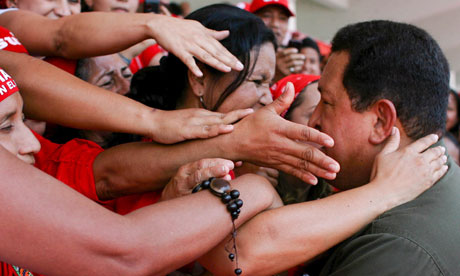
Hugo Chavez with his supporters in 2009. Photograph: Prensa PSUV/EPA
The funeral of President Hugo Chávez of Venezuela took place on International Women's Day – a fitting day of departure for "the president of the poor" who was loved by millions, especially by women, the poorest.
When Chávez was elected in 1998, the grassroots movement took a leap in power, and women in particular were empowered. Women were the first into the streets against the 2002 US-backed coup; their mobilisation saved the revolution. When asked why, woman after woman said: "Chávez is us, he is our son." He was an extension of who they were as strugglers for survival.
Chávez soon learnt that the revolution he led depended on women, and said so: "Only women have the passion and the love to make the revolution." He acknowledged that the "missions" – the new social services which were at the heart of his popularity and which the state funded but did not run – were mainly created and run by grassroots neighbourhood women.
In 2006, when announcing the partial implementation of Article 88 of the new constitution recognising caring work as productive – a breakthrough worldwide – Chávez said: "[Women] work so hard raising their children, ironing, washing, preparing food … giving [their children] an orientation … This was never recognised as work yet it is such hard work! ... Now the revolution puts you first, you too are workers, you housewives, workers in the home."
Chávez was not the first movement leader who went on to head the government, to have understood women's centrality to creating the new society they were striving to build.
Half a century ago, Julius Nyerere, leader of Tanzania's independence struggle and its first president, aimed his programme for development at the elimination of two ills: women's inequality and poverty. He said: "Women who live in villages work harder than anyone in Tanzania," working "in the fields and in the homes".
"The truth is that in the villages the women work very hard. At times they work for 12 or 14 hours a day. They even work on Sundays and public holidays." Whereas the village men "are on leave half their lives".
Nyerere's ujaama or "African socialism" – self-reliance and co-operation – was to keep Tanzania independent, by enabling it to refuse foreign loans. He insisted men must do their share. Equity was a question not only of justice but of economic necessity and political independence.
Encouraged by Nyerere, in one region 17, ujamaa villages created a communal society based on equity among women and men, children and adults – all contributed what they could and all shared equally in the wealth produced. Their extraordinary society was destroyed by Nyerere's power-hungry colleagues against his will, but it showed us what is possible.
Closer to Venezuela, women gained recognition under Jean-Bertrand Aristide, Haiti's first democratically elected president (1990 and 2000). Determined to tackle extreme poverty and injustice, Aristide created a Ministry of Women's Affairs, appointed women to ministerial posts, supported girl domestic workers, and survivors of military rape. As in Venezuela, women were the main organisers and beneficiaries of literacy and health programmes; the rise in the minimum wage benefited them especially – sweatshop workers are mainly women.
Young people's love for Aristide is legendary, but women's devotion has been as constant. Two months after the devastating 2010 earthquake, women collected 20,000 signatures in three days demanding President Aristide's return from exile – they needed him for reconstruction. A year later he was back, not as president but as educator, reopening the medical school he had founded for poor students, which the coup had closed.
In Bolivia, indigenous women were recognised as central to the mass mobilisations which propelled Evo Morales into the presidency. These included the "water wars" which drove the multinational Bechtel out of Bolivia (they privatised the water and criminalised people who collected rain water). In 2008 the women were prominent in surrounding Congress for several days while the new constitution was debated; the white parliamentary elite intended to absent themselves to prevent a vote. The blockade forced them to sleep in the building till the vote was taken. That constitution heralded a new level of power for women – from pay equity to recognition for the economic value of caring work.
As the president of the poor is laid to rest, the historic Operation Condor trial opens in Argentina, tackling the co-ordinated campaign of state terror of former Latin American dictatorships. We must recall a little-known aspect of Chávez's legacy. Venezuela's oil revenue supported Argentina's Presidents Nestor and Cristina Kirchner, enabling them to pass laws removing the military's immunity from prosecution. The Mothers and Grandmothers of the Plaza de Mayo, who led the 1983 overthrow of the dictatorship, and who had long campaigned for justice for the thousands the dictatorships raped, murdered and disappeared, have long paid tribute to Chávez – a most unusual military man.
They, like women all over South America and beyond, will be watching anxiously to see that the gains of the Bolivarian revolution are not undermined.
Friday, 8 March 2013
Tariq Ali: Hugo Chávez and me
The late president of Venezuela, who I have met many times, will be remembered by his supporters as a lover of literature, a fiery speaker and a man who fought for his people and won
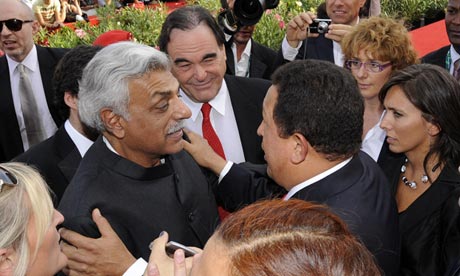
Chávez, director Oliver Stone and Tariq Ali at the Venice film festival in 2009. Photograph: Damien Meyer/AFP/Getty Images
Once I asked whether he preferred enemies who hated him because they knew what he was doing or those who frothed and foamed out of ignorance. He laughed. The former was preferable, he explained, because they made him feel that he was on the right track. Hugo Chávez's death did not come as a surprise, but that does not make it easier to accept. We have lost one of the political giants of the post-communist era. Venezuela, its elites mired in corruption on a huge scale, had been considered a secure outpost of Washington and, at the other extreme, the Socialist International. Few thought of the country before his victories. After 1999, every major media outlet of the west felt obliged to send a correspondent. Since they all said the same thing (the country was supposedly on the verge of a communist-style dictatorship) they would have been better advised to pool their resources.
I first met him in 2002, soon after the military coup instigated by Washington and Madrid had failed and subsequently on numerous occasions. He had asked to see me during the World Social Forum in Porto Alegre, Brazil. He inquired: "Why haven't you been to Venezuela? Come soon." I did. What appealed was his bluntness and courage. What often appeared as sheer impulsiveness had been carefully thought out and then, depending on the response, enlarged by spontaneous eruptions on his part. At a time when the world had fallen silent, when centre-left and centre-right had to struggle hard to find some differences and their politicians had become desiccated machine men obsessed with making money, Chávez lit up the political landscape.
He appeared as an indestructible ox, speaking for hours to his people in a warm, sonorous voice, a fiery eloquence that made it impossible to remain indifferent. His words had a stunning resonance. His speeches were littered with homilies, continental and national history, quotes from the 19th-century revolutionary leader and president of VenezuelaSimón Bolívar, pronouncements on the state of the world and songs. "Our bourgeoisie are embarrassed that I sing in public. Do you mind?" he would ask the audience. The response was a resounding "No". He would then ask them to join in the singing and mutter, "Louder, so they can hear us in the eastern part of the city." Once before just such a rally he looked at me and said: "You look tired today. Will you last out the evening?" I replied: "It depends on how long you're going to speak." It would be a short speech, he promised. Under three hours.
The Bolívarians, as Chávez's supporters were known, offered a political programme that challenged the Washington consensus: neo-liberalism at home and wars abroad. This was the prime reason for the vilification of Chávez that is sure to continue long after his death.
Politicians like him had become unacceptable. What he loathed most was the contemptuous indifference of mainstream politicians in South America towards their own people. The Venezuelan elite is notoriously racist. They regarded the elected president of their country as uncouth and uncivilised, a zambo of mixed African and indigenous blood who could not be trusted. His supporters were portrayed on private TV networks as monkeys. Colin Powell had to publicly reprimand the US embassy in Caracas for hosting a party where Chávez was portrayed as a gorilla.
Was he surprised? "No," he told me with a grim look on his face. "I live here. I know them well. One reason so many of us join the army is because all other avenues are sealed." No longer. He had few illusions. He knew that local enemies did not seethe and plot in a vacuum. Behind them was the world's most powerful state. For a few moments he thought Obama might be different. The military coup in Honduras disabused him of all such notions.
He had a punctilious sense of duty to his people. He was one of them. Unlike European social democrats he never believed that any improvement in humankind would come from the corporations and the bankers and said so long before the Wall Street crash of 2008. If I had to pin a label on him, I would say that he was a socialist democrat, far removed from any sectarian impulses and repulsed by the self-obsessed behaviour of various far-left sects and the blindness of their routines. He said as much when we first met.
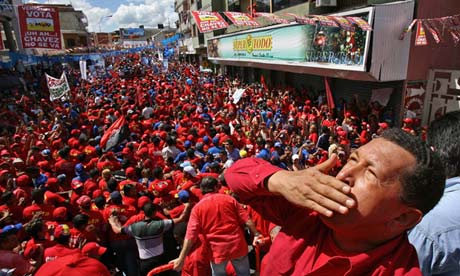 Chávez greets supporters during a political gathering in 2006. Photograph: AFP/Getty Images
Chávez greets supporters during a political gathering in 2006. Photograph: AFP/Getty Images
The following year in Caracas I questioned him further on the Bolívarian project. What could be accomplished? He was very clear; much more so than some of his over-enthusiastic supporters: ''I don't believe in the dogmatic postulates of Marxist revolution. I don't accept that we are living in a period of proletarian revolutions. All that must be revised. Reality is telling us that every day. Are we aiming in Venezuela today for the abolition of private property or a classless society? I don't think so. But if I'm told that because of that reality you can't do anything to help the poor, the people who have made this country rich through their labour – and never forget that some of it was slave labour – then I say: 'We part company.' I will never accept that there can be no redistribution of wealth in society. Our upper classes don't even like paying taxes. That's one reason they hate me. We said: 'You must pay your taxes.' I believe it's better to die in battle, rather than hold aloft a very revolutionary and very pure banner, and do nothing … That position often strikes me as very convenient, a good excuse … Try and make your revolution, go into combat, advance a little, even if it's only a millimetre, in the right direction, instead of dreaming about utopias."
I remember sitting next to an elderly, modestly attired woman at one of his public rallies. She questioned me about him. What did I think? Was he doing well? Did he not speak too much? Was he not too rash at times? I defended him. She was relieved. It was his mother, worried that perhaps she had not brought him up as well as she should have done: "We always made sure that he read books as a child." This passion for reading stayed with him. History, fiction and poetry were the loves of his life: "Like me, Fidel is an insomniac. Sometimes we're reading the same novel. He rings at 3am and asks: 'Well, have you finished? What did you think?' And we argue for another hour.'"
It was the spell of literature that in 2005 led him to celebrate the 400th anniversary of Cervantes's great novel in a unique fashion. The ministry of culture reprinted a million copies of Don Quixote and distributed them free to a million poor, but now literate, households. A quixotic gesture? No. The magic of art can't transform the universe, but it can open up a mind. Chávez was confident that the book would be read now or later.
The closeness to Castro has been portrayed as a father-son relationship. This is only partially the case. Last year a huge crowd had gathered outside the hospital in Caracas, where Chávez was meant to be recuperating from cancer treatment, and their chants got louder and louder. Chávez ordered a loudspeaker system on the rooftop. He then addressed the crowd. Watching this scene on Telesur in Havana, Castro was shocked. He rang the director of the hospital: "This is Fidel Castro. You should be sacked. Get him back into bed and tell him I said so."
Above the friendship, Chávez saw Castro and Che Guevara in a historical frame. They were the 20th-century heirs of Bolívar and his friend Antonio José de Sucre. They tried to unite the continent, but it was like ploughing the sea. Chávez got closer to that ideal than the quartet he admired so much. His successes in Venezuela triggered a continental reaction: Bolivia and Ecuador saw victories. Brazil under Lula and Dilma did not follow the social model but refused to allow the west to pit them against each other. It was a favoured trope of western journalists: Lula is better than Chávez. Only last year Lula publicly declared that he supported Chávez, whose importance for "our continent" should never be underestimated.
The image of Chávez most popular in the west was that of an oppressive caudillo. Had this been true I would wish for more of them. The Bolívarian constitution, opposed by the Venezuelan opposition, its newspapers and TV channels and the local CNN, plus western supporters, was approved by a large majority of the population. It is the only constitution in the world that affords the possibility of removing an elected president from office via a referendum based on collecting sufficient signatures. Consistent only in their hatred for Chávez, the opposition tried to use this mechanism in 2004 to remove him. Regardless of the fact that many of the signatures were those of dead people, the Venezuelan government decided to accept the challenge.
I was in Caracas a week before the vote. When I met Chávez at the Miraflores palace he was poring over the opinion polls in great detail. It might be close. "And if you lose?" I asked. "Then I will resign," he replied without hesitation. He won.
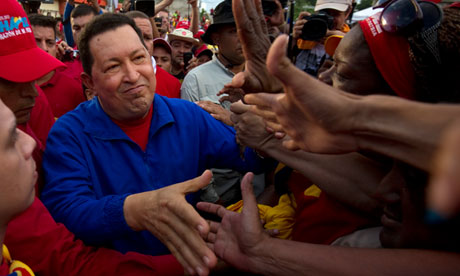 Chávez on the streets of Cabimas in September last year. Photograph: Juan Barreto/AFP/Getty Images
Chávez on the streets of Cabimas in September last year. Photograph: Juan Barreto/AFP/Getty ImagesDid he ever tire? Get depressed? Lose confidence? "Yes," he replied. But it was not the coup attempt or the referendum. It was the strike organised by the corrupted oil unions and backed by the middle-classes that worried him because it would affect the entire population, especially the poor: "Two factors helped sustain my morale. The first was the support we retained throughout the country. I got fed up sitting in my office. So with one security guard and two comrades I drove out to listen to people and breathe better air. The response moved me greatly. A woman came up to me and said: 'Chávez follow me, I want to show you something.' I followed her into her tiny dwelling. Inside, her husband and children were waiting for the soup to be cooked. 'Look at what I'm using for fuel … the back of our bed. Tomorrow I'll burn the legs, the day after the table, then the chairs and doors. We will survive, but don't give up now.' On my way out the kids from the gangs came and shook hands. 'We can live without beer. You make sure you screw these motherfuckers.'"
What was the inner reality of his life? For anyone with a certain level of intelligence, of character and culture, his or her natural leanings, emotional and intellectual, hang together, constitute a whole not always visible to everyone. He was a divorcee, but affection for his children and grandchildren was never in doubt. Most of the women he loved, and there were a few, described him as a generous lover, and this was long after they had parted.
What of the country he leaves behind? A paradise? Certainly not. How could it be, given the scale of the problems? But he leaves behind a very changed society in which the poor felt they had an important stake in the government. There is no other explanation for his popularity. Venezuela is divided between his partisans and detractors. He died undefeated, but the big tests lie ahead. The system he created, a social democracy based on mass mobilisations, needs to progress further. Will his successors be up to the task? In a sense, that is the ultimate test of the Bolívarian experiment.
Of one thing we can be sure. His enemies will not let him rest in peace. And his supporters? His supporters, the poor throughout the continent and elsewhere, will see him as a political leader who promised and delivered social rights against heavy odds; as someone who fought for them and won.
Subscribe to:
Comments (Atom)
